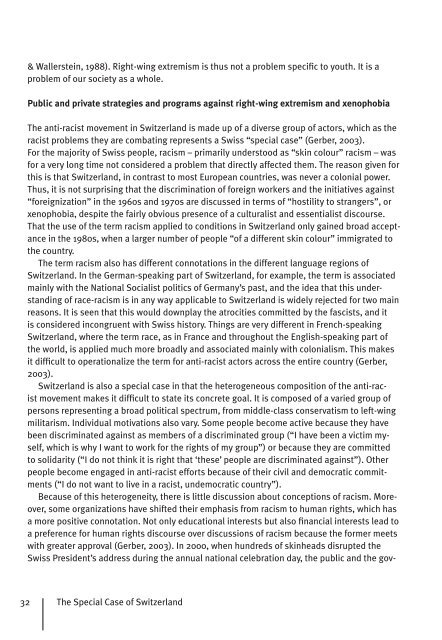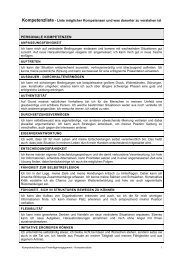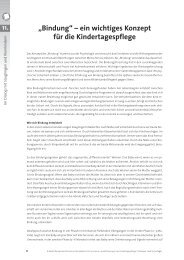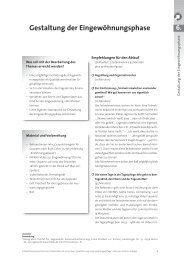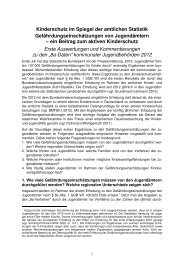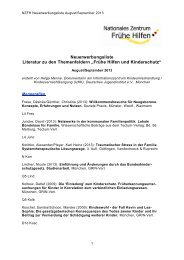Prevention of Right-Wing Extremism, Xenophobia and Racism in ...
Prevention of Right-Wing Extremism, Xenophobia and Racism in ...
Prevention of Right-Wing Extremism, Xenophobia and Racism in ...
Create successful ePaper yourself
Turn your PDF publications into a flip-book with our unique Google optimized e-Paper software.
& Wallerste<strong>in</strong>, 1988). <strong>Right</strong>-w<strong>in</strong>g extremism is thus not a problem specifi c to youth. It is a<br />
problem <strong>of</strong> our society as a whole.<br />
Public <strong>and</strong> private strategies <strong>and</strong> programs aga<strong>in</strong>st right-w<strong>in</strong>g extremism <strong>and</strong> xenophobia<br />
The anti-racist movement <strong>in</strong> Switzerl<strong>and</strong> is made up <strong>of</strong> a diverse group <strong>of</strong> actors, which as the<br />
racist problems they are combat<strong>in</strong>g represents a Swiss “special case” (Gerber, 2003).<br />
For the majority <strong>of</strong> Swiss people, racism – primarily understood as “sk<strong>in</strong> colour” racism – was<br />
for a very long time not not considered a problem that directly affected them. The reason given for<br />
this is that Switzerl<strong>and</strong>, <strong>in</strong> contrast to most European countries, was never a colonial power.<br />
Thus, it is not surpris<strong>in</strong>g surpris<strong>in</strong>g that the discrim<strong>in</strong>ation <strong>of</strong> foreign workers <strong>and</strong> the <strong>in</strong>itiatives aga<strong>in</strong>st<br />
“foreignization” <strong>in</strong> the 1960s <strong>and</strong> 1970s are discussed <strong>in</strong> terms <strong>of</strong> “hostility to strangers”, or<br />
xenophobia, despite the fairly obvious presence <strong>of</strong> a culturalist <strong>and</strong> essentialist discourse.<br />
That the use <strong>of</strong> the term racism applied to conditions <strong>in</strong> Switzerl<strong>and</strong> only ga<strong>in</strong>ed broad acceptaccept- ance <strong>in</strong> the 1980s, when a larger number <strong>of</strong> people “<strong>of</strong> a different sk<strong>in</strong> colour” immigrated to<br />
the country.<br />
The term racism also has different connotations <strong>in</strong> the different language regions <strong>of</strong><br />
Switzerl<strong>and</strong>. In the German-speak<strong>in</strong>g part <strong>of</strong> Switzerl<strong>and</strong>, for example, the term is associated<br />
ma<strong>in</strong>ly with the National Socialist politics politics <strong>of</strong> Germany’s past, <strong>and</strong> the idea that this under-<br />
st<strong>and</strong><strong>in</strong>g <strong>of</strong> race-racism is <strong>in</strong> any way applicable to Switzerl<strong>and</strong> is widely rejected for two ma<strong>in</strong><br />
reasons. It is seen that this would downplay the atrocities committed by the fascists, <strong>and</strong> it<br />
is considered <strong>in</strong>congruent with Swiss history. Th<strong>in</strong>gs are very different <strong>in</strong> French-speak<strong>in</strong>g<br />
Switzerl<strong>and</strong>, where the term race, as <strong>in</strong> France <strong>and</strong> throughout the English-speak<strong>in</strong>g part <strong>of</strong><br />
the world, is applied much more broadly <strong>and</strong> associated ma<strong>in</strong>ly with colonialism. This makes<br />
it diffi cult to operationalize the term for anti-racist actors across the entire country (Gerber,<br />
2003).<br />
Switzerl<strong>and</strong> is also a special case <strong>in</strong> that the heterogeneous composition <strong>of</strong> the anti-racanti-rac- ist movement makes it diffi cult to state its its concrete goal. It is composed <strong>of</strong> a varied group <strong>of</strong><br />
per sons represent<strong>in</strong>g a broad political spectrum, from middle-class conservatism to left-w<strong>in</strong>g<br />
militarism. Individual motivations also vary. Some people become active because they have<br />
been discrim<strong>in</strong>ated discrim<strong>in</strong>ated aga<strong>in</strong>st as members <strong>of</strong> a discrim<strong>in</strong>ated group (“I have been a victim my-<br />
self, which is why I want to work for the rights <strong>of</strong> my group”) or because they are committed<br />
to solidarity (“I do not th<strong>in</strong>k it is right that ‘these’ people are discrim<strong>in</strong>ated aga<strong>in</strong>st”). Other<br />
people become engaged <strong>in</strong> anti-racist efforts because <strong>of</strong> their civil <strong>and</strong> democratic commit-<br />
ments (“I do not want to live <strong>in</strong> a racist, undemocratic country”).<br />
Because <strong>of</strong> this heterogeneity, there is little discussion about conceptions <strong>of</strong> racism. More- More-<br />
over, some organizations have shifted their emphasis from racism to human rights, which has<br />
a more positive connotation. Not only educational <strong>in</strong>terests but also fi nancial <strong>in</strong>terests lead to<br />
a preference for human rights discourse over discussions <strong>of</strong> racism because the former meets<br />
with greater approval (Gerber, 2003). In 2000, when hundreds <strong>of</strong> sk<strong>in</strong>heads disrupted the<br />
Swiss President’s address dur<strong>in</strong>g the annual national celebration day, the public <strong>and</strong> the gov-<br />
32 The Special Case <strong>of</strong> Switzerl<strong>and</strong>


